2017年高考英语词汇解析
- 格式:docx
- 大小:24.07 MB
- 文档页数:145

2017高考英语易错词汇解析:常用副词辨析副词辨析fairly,quite,rather,very,pretty这几个词都可表示程度,用法区别如下:含义上的区别(1) fairly 语气最轻,尽管经常与褒义词连用,但由于语气较弱,往往不带明显的恭维或赞赏,通常译为“还算”、“相当”。
比如要说某部电影 fairly good,指的可能是还勉强过得去,只是没有否定。
(2) quite 语气稍重,意为“颇”或“相当”。
要是说某一部电影quite good,那是说这部电影相当不错,虽不是最好,但至少值得看。
(3) rather 或 pretty 在语气上又稍重一点,意为“十分”或“相当” (pretty 不如rather 正式)。
要是说某一部电影 rather / pretty good,指的是这电影相当不错,语气比较重,意指要高出一般水平或出乎意料地好。
两者均可与褒义或贬义形容词连用。
与褒义词连用,表示一种愉快的心情;与贬义(包括中性)词连用,表示一种不赞成或不满意的心情。
如:a rather [pretty] good play 相当好的戏rather [pretty] poor work 相当差的工作(4) very 语气最强,意为“很”或“非常”。
要是说某一部电影very good,这是说这部电影很不错,算得上是精品之作。
这些词语气的轻重可大致描述为:(not) → fairly → quite → rather / pretty → very用法上的差别(1) 以上各词中,只有 rather 可以与比较级以及副词 too (太) 连用。
如:It‘s rather warmer today. 今天暖和多了。
This one is rather too large. 这个稍大了一点。
注:quite 有时也与比较级连用,但通常只限于 quite better (身体好)这一表达中。
(2) rather 和 quite 有时可直接修饰动词,而其他几个副词一般不这样用。
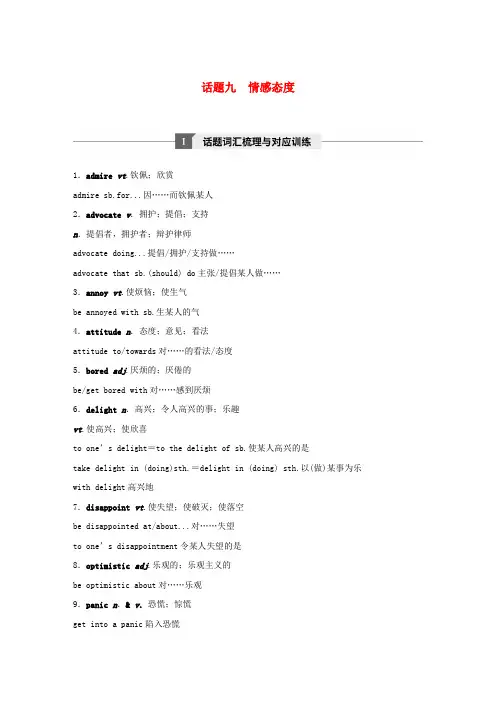
话题九情感态度1.admire vt.钦佩;欣赏admire sb.for...因……而钦佩某人2.advocate v.拥护;提倡;支持n.提倡者,拥护者;辩护律师advocate doing...提倡/拥护/支持做……advocate that sb.(should) do主张/提倡某人做……3.annoy vt.使烦恼;使生气be annoyed with sb.生某人的气4.attitude n.态度;意见;看法attitude to/towards对……的看法/态度5.bored adj.厌烦的;厌倦的be/get bored with对……感到厌烦6.delight n.高兴;令人高兴的事;乐趣vt.使高兴;使欣喜to one’s delight=to the delight of sb.使某人高兴的是take delight in (doing)sth.=delight in (doing) sth.以(做)某事为乐with delight高兴地7.disappoint vt.使失望;使破灭;使落空be disappointed at/about...对……失望to one’s disappointment令某人失望的是8.optimistic adj.乐观的;乐观主义的be optimistic about对……乐观9.panic n.& v.恐慌;惊慌get into a panic陷入恐慌in panic惊慌失措地panic sb.into doing sth.使某人惊慌失措地做某事10.pity n.同情;遗憾have pity on sb.对某人表示同情out of pity出于同情It’s a great pity th at...很遗憾……11.pride n.骄傲,自豪take pride in以……为自豪,对……感到得意with pride骄傲地;自豪地be proud of.../that...为……自豪be proud to do...为(能)做……自豪12.puzzle vt.& vi.(使)迷惑;(使)为难n.谜;难题puzzle over/about苦思冥想;绞尽脑汁be in a puzzle (about) (对……)不知如何是好be puzzled about对……迷惑不解13.satisfy v.使满意,使满足;满足be satisfied to do.../with...对(做)……感到满意in/with satisfaction满意地to one’s satisfaction使某人满意的是14.scare vt.使恐惧,惊吓scare sb.into doing sth.恐吓某人做某事scare sb.away/off把某人吓跑be scared to death吓得要死be scared to do sth./of doing sth.害怕做某事15.shock v.(使)震惊;震动n.休克;打击;震惊be shocked by/at...对……感到震惊be shocked to do...因做……而震惊16.suspect vt.怀疑;认为n.被怀疑者;嫌疑犯suspect sb.of (doing) sth.怀疑某人(做)某事suspect that...怀疑……17.sympathy n.同情(心);赞同;支持with sympathy同情地out of sympathy出于同情18.terrify vt.使恐怖,恐吓terrify sb.into doing...吓唬某人做……be terrified of害怕;吓唬be terrified at/with对……感到恐惧19.upset adj.心烦意乱的;不安的,不快的vt.使不安;使心烦;打乱;扰乱vi.打翻;碰倒It upsets sb.to do...因做……使某人感到心烦/不安It upsets sb.that...让某人心烦的是……20.light短语in the light of考虑到;鉴于bring sth.to light披露;暴露come to light为人所知;暴露throw light on使……真相大白make light of轻视Ⅰ.单句语法填空1.While still at primary school,Rowan had already shown (admire) acting talent.2.Local businesses were scared paying protection money.3.The (annoy) thing about the s cheme is that it’s confusing.4.He was getting bored doing the same thing every day.5. (delight) at your ability,I’ll go on working with you.6.The report advocated that all buildings (fit) with smoke detectors. 7.I looked pride at what I had achieved.8.This discovery will throw light the problem.9.is a pity that you can’t come to the party.10.She got into real panic when she thought she’d lost the ticket. 11.His last paintings are perhaps the most (puzzle),which even puzzle all the artists.12.The police suspected him having taken the money.13.It upset him nobody had bothered to tell him about it.14.I still find it (terrify) to find myself surrounded by large numbers of horses.15.To our (satisfy),he got the first prize in the competition. Ⅱ.根据要求完成句子1.They advocate that they should reduce air pollution.①(改为简单句) ②(用it作形式主语改写)2.他发现他们没有等他而感到十分烦恼。
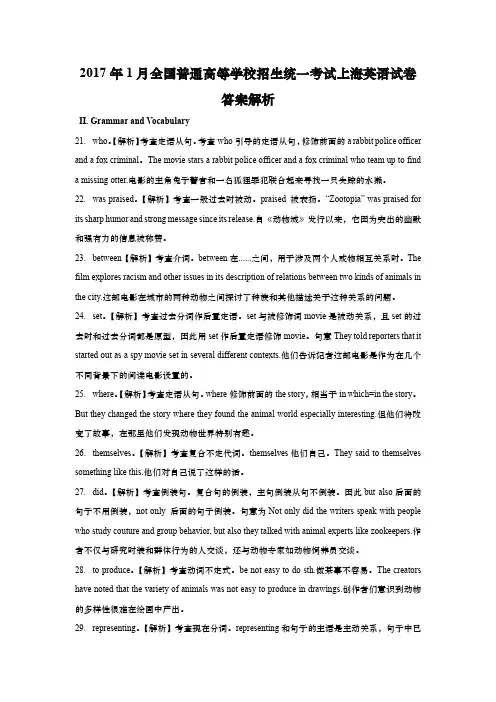
2017年1月全国普通高等学校招生统一考试上海英语试卷答案解析II. Grammar and Vocabulary21.who。
【解析】考查定语从句。
考查who引导的定语从句,修饰前面的a rabbit police officer and a fox criminal。
The movie stars a rabbit police officer and a fox criminal who team up to finda missing otter.电影的主角兔子警官和一名狐狸罪犯联合起来寻找一只失踪的水獭。
22.was praised。
【解析】考查一般过去时被动。
praised 被表扬。
“Zootopia” was praised for its sharp humor and strong message since its release.自《动物城》发行以来,它因为突出的幽默和强有力的信息被称赞。
23.between【解析】考查介词。
between在......之间,用于涉及两个人或物相互关系时。
The film explores racism and other issues in its description of relations between two kinds of animals in the city.这部电影在城市的两种动物之间探讨了种族和其他描述关于这种关系的问题。
24.set。
【解析】考查过去分词作后置定语。
set与被修饰词movie是被动关系,且set的过去时和过去分词都是原型,因此用set作后置定语修饰movie。
句意They told reporters that it started out as a spy movie set in several different contexts.他们告诉记者这部电影是作为在几个不同背景下的间谍电影设置的。
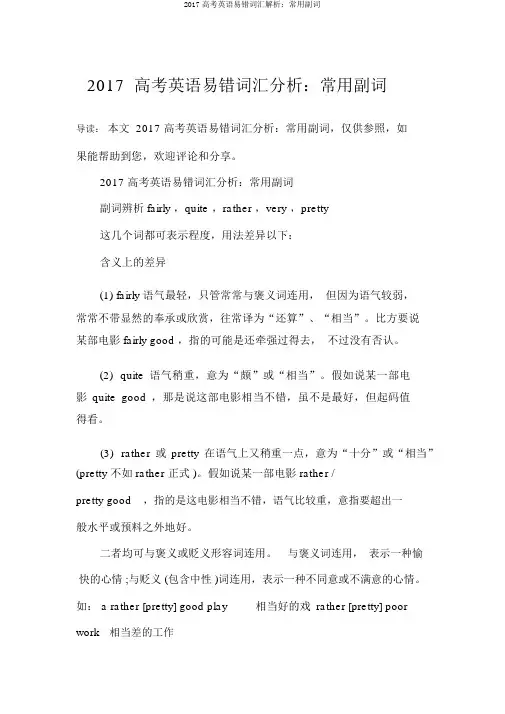
2017 高考英语易错词汇分析:常用副词导读:本文 2017 高考英语易错词汇分析:常用副词,仅供参照,如果能帮助到您,欢迎评论和分享。
2017 高考英语易错词汇分析:常用副词副词辨析 fairly ,quite ,rather ,very ,pretty这几个词都可表示程度,用法差异以下:含义上的差异(1)fairly 语气最轻,只管常常与褒义词连用,但因为语气较弱,常常不带显然的奉承或欣赏,往常译为“还算”、“相当”。
比方要说某部电影 fairly good ,指的可能是还牵强过得去,不过没有否认。
(2)quite 语气稍重,意为“颇”或“相当”。
假如说某一部电影quite good ,那是说这部电影相当不错,虽不是最好,但起码值得看。
(3)rather 或pretty 在语气上又稍重一点,意为“十分”或“相当”(pretty 不如 rather 正式 )。
假如说某一部电影 rather /pretty good,指的是这电影相当不错,语气比较重,意指要超出一般水平或预料之外地好。
二者均可与褒义或贬义形容词连用。
与褒义词连用,表示一种愉快的心情 ;与贬义 (包含中性 )词连用,表示一种不同意或不满意的心情。
如: a rather [pretty] good play相当好的戏rather [pretty] poorwork相当差的工作(4)very 语气最强,意为“很”或“特别”。
假如说某一部电影very good,这是说这部电影很不错,算得上是精选之作。
这些词语气的轻重可大概描绘为:(n ot)→ fairly→ quite→rather / pretty→ very用法上的差异(1)以上各词中,只有 rather 能够与比较级以及副词 too ( 太)连用。
如:It‘ s rather warmer today今.天温暖多了。
This one is rather too large.这个稍大了一点。

高考/备考辅导2017年高考英语词汇辨析:awake, wake, awaken, waken的区别高考英语词汇辨析:awake, wake, awaken, waken的区别这几个词在使用时经常搞混,其区别大致可从以下几方面去看:1. 从词形变换来看:wake 和 awake 的过去式和过去分词可以是规则的(waked, waked 和 awaked, awaked),也可以是不规则的(woke, woken 和 awoke, awoken),但在现代英语中通常只用其不规则变换形式。
2. 从是否及物来看:从理论上说,这四个动词都可用作及物或不及物动词;但从实际使用上看,wake 和 awake 多用作不及物动词,而 waken,awaken 多用作及物动词。
3. 从是否连用副词 up 来看:wake 通常可与 up 连用,waken 可以与 up 连用,而 awake 和 awaken 则一般不与 up 连用。
4. 从是否用于比喻义来看:awake 和 awaken 尽管可以用于本义表示“醒来”或“弄醒”,但更多是用于比喻义表示“认识到”、“意识到”等;wake (up) 通常用于本义,也可用于比喻义;但 waken 则主要用于本义,一般不用于比喻义。
5.从词性上看:awake 除用作动词外,还可用作形容词(只用作表语,意为“醒着的”、“意识到”),而其余三个词通常用作动词,不能用作形容词。
如:He is wide awake. 他还没有一点睡意。
They aren’t awake to the difficuties. 他们没有意识到这些困难。
注:形容词 awake 通常用 wide,fully 等修饰,一般不用 very 修饰。
6. 从用词的通俗性来看:在这四个动词中,wake (up) 是最普通也是最不正式的一个词。
如果只考虑其正确性而不考虑其普通性,有时一个意思可能有多种表达:He woke up [awoke, wakened, wakened up, awakened] when I entered. 当我进来时他醒了。
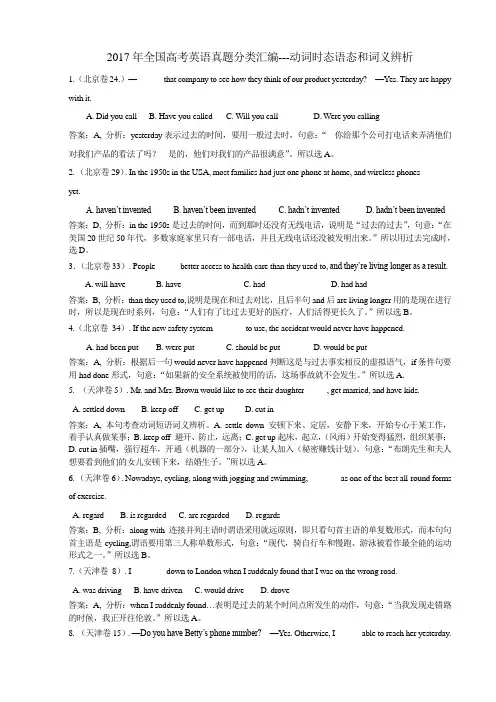
2017年全国高考英语真题分类汇编---动词时态语态和词义辨析1. (北京卷24.)—______ that company to see how they think of our product yesterday? —Yes. They are happy with it.A. Did you callB. Have you calledC. Will you callD. Were you calling答案:A, 分析:yesterday表示过去的时间,要用一般过去时,句意:“---你给那个公司打电话来弄清他们对我们产品的看法了吗?---是的,他们对我们的产品很满意”。
所以选A。
2. (北京卷29). In the 1950s in the USA, most families had just one phone at home, and wireless phones _______ yet.A. haven’t inventedB. haven’t been inventedC. hadn’t inventedD. hadn’t been invented答案:D, 分析:in the 1950s是过去的时间,而到那时还没有无线电话,说明是“过去的过去”,句意:“在美国20世纪50年代,多数家庭家里只有一部电话,并且无线电话还没被发明出来。
”所以用过去完成时,选D。
3.(北京卷33). People______better access to health care than they used to, and they’re living longer as a result.A. will haveB. haveC. hadD. had had答案:B, 分析:than they used to,说明是现在和过去对比,且后半句and后are living longer用的是现在进行时,所以是现在时系列,句意:“人们有了比过去更好的医疗,人们活得更长久了。
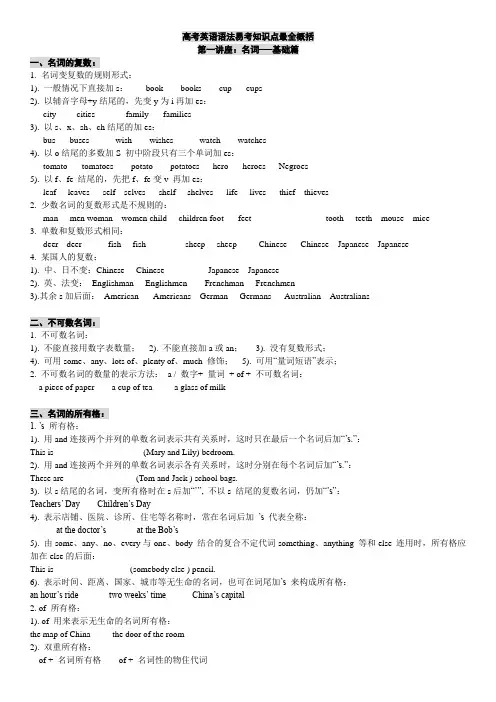
高考英语语法易考知识点最全概括第一讲座:名词---基础篇一、名词的复数:1. 名词变复数的规则形式:1). 一般情况下直接加s:book------books cup-----cups2). 以辅音字母+y结尾的,先变y为i再加es:city-------cities family-----families3). 以s、x、sh、ch结尾的加es:bus-----buses wish------wishes watch------watches4). 以o结尾的多数加S 初中阶段只有三个单词加es:tomato-----tomatoes potato------potatoes hero-----heroes Negroes5). 以f、fe 结尾的,先把f、fe变v 再加es:leaf----leaves self---selves shelf----shelves life----lives thief---thieves2. 少数名词的复数形式是不规则的:man----men woman---women child----children foot-----feet tooth----teeth mouse---mice3. 单数和复数形式相同:deer---deer fish----fish sheep----sheep Chinese ----Chinese Japanese---Japanese4. 某国人的复数:1). 中、日不变:Chinese----Chinese Japanese---Japanese2). 英、法变:Englishman----Englishmen Frenchman----Frenchmen3).其余s加后面:American-----Americans German----Germans Australian---Australians二、不可数名词:1. 不可数名词:1). 不能直接用数字表数量;2). 不能直接加a或an;3). 没有复数形式;4). 可用some、any、lots of、plenty of、much 修饰;5). 可用“量词短语”表示;2. 不可数名词的数量的表示方法:a / 数字+ 量词+ of + 不可数名词:a piece of paper a cup of tea a glass of milk三、名词的所有格:1. ’s 所有格:1). 用and连接两个并列的单数名词表示共有关系时,这时只在最后一个名词后加“’s.”:This is ____________________(Mary and Lily) bedroom.2). 用and连接两个并列的单数名词表示各有关系时,这时分别在每个名词后加“’s.”:These are ________________(Tom and Jack ) school bags.3). 以s结尾的名词,变所有格时在s后加“’”,不以s 结尾的复数名词,仍加“’s”:Teachers’ Day Children’s Day4). 表示店铺、医院、诊所、住宅等名称时,常在名词后加’s 代表全称:at the doctor’s at the Bob’s5). 由some、any、no、every与one、body 结合的复合不定代词something、anything 等和else 连用时,所有格应加在else的后面:This is _________________(somebody else ) pencil.6). 表示时间、距离、国家、城市等无生命的名词,也可在词尾加’s 来构成所有格:an hour’s ride two weeks’ time China’s capital2. of 所有格:1). of 用来表示无生命的名词所有格:the map of China the door of the room2). 双重所有格:of + 名词所有格of + 名词性的物住代词He is a friend of my _________(brother ).Is she a daughter of __________(you)?四、名词作句子成分:1. 名词作主语:1). 表示时间、金钱、距离作主语时,谓语动词用单数:Two hours ________(be) enough for us to get there.2). 量词短语“数字+量词+ of +…”作主语时,谓语动词应与量词保持一致:A pair of shoes _______(be) under the bed.Two pieces of paper _______(be) on the desk.3). 名词+介词(with、but、except、along with、as well as …….)+名词作主语时,谓语动词应与前面的名词保持一致:The teacher with the students _________(be) planting trees on the hill.4). 短语“neither…nor…、either…or…、not only…but also …”连接主语时,谓语动词实行就近原则:Neither he nor I ______ (be) a Frenchman.2. 名词作定语:1). 名词作定语时,一般用单数形式:There is a shoe factory near the school.2). 名词作定语时,个别情况用复数形式:(sport )The sports meeting will be held next week.3). man、woman 作定语表示性别时,man、woman随后面的名词单复数而变:one man teacher two women teachers第二讲座:名词---提高篇一、名词的单复数:1. 可数名词的复数不规则变化:(1) 单复数同形:deer, sheep, Chinese, means, series, species, works, headquarters(2) 形单意复:people, police, youth, cattle, staff(3) 形复意单:news, physics, politics, maths(4)合成词变复数:passerby→passersby, soninlaw→sonsin-law, lookeron→lookerson, gobetween→go-betweens, grownup→grownups(5) 词形变化:man→men, child→children,tooth→teeth, foot→feet, mouse→mice,medium→media2. 不可数名词的数:(1) 有些抽象名词在具体化时,以复数形式出现;表示特指时,可以和定冠词连用;表示“某种”或“一次”的意义时,可以和不定冠词连用:in surprise“惊讶地”,a surprise“一件令人惊讶的事”;win success“获得成功”,a success“一个/件成功的人/事”;by experience“靠经验”,an experience“一次经历”;with pleasure“乐意”,a p leasure“一件乐事”。
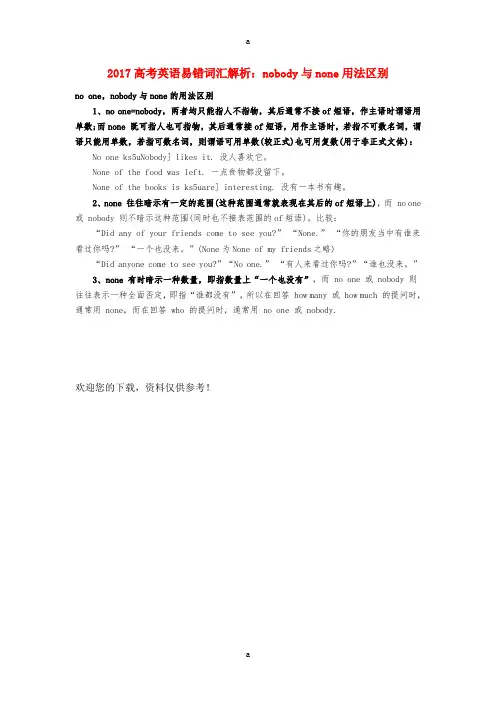
a
2017高考英语易错词汇解析:nobody与none用法区别
no one,nobody与none的用法区别
1、no one=nobody,两者均只能指人不指物,其后通常不接of短语,作主语时谓语用单数;而none 既可指人也可指物,其后通常接of短语,用作主语时,若指不可数名词,谓语只能用单数,若指可数名词,则谓语可用单数(较正式)也可用复数(用于非正式文体):No one ks5uNobody] likes it. 没人喜欢它。
None of the food was left. 一点食物都没留下。
None of the books is ks5uare] interesting. 没有一本书有趣。
2、none 往往暗示有一定的范围(这种范围通常就表现在其后的of短语上),而 no one 或 nobody 则不暗示这种范围(同时也不接表范围的of短语)。
比较:
“Did any of your friends come to see you?” “None.” “你的朋友当中有谁来看过你吗?” “一个也没来。
”(None为None of my friends之略)
“Did anyone come to see you?”“No one.” “有人来看过你吗?”“谁也没来。
”
3、none 有时暗示一种数量,即指数量上“一个也没有”,而 no one 或 nobody 则往往表示一种全面否定,即指“谁都没有”,所以在回答 how many 或 how much 的提问时,通常用 none,而在回答 who 的提问时,通常用 no one 或 nobody.
欢迎您的下载,资料仅供参考!
a。
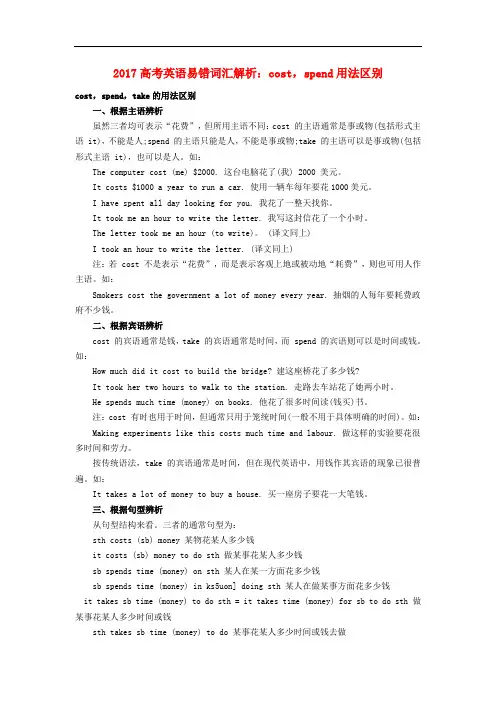
2017高考英语易错词汇解析:cost,spend用法区别cost,spend,take的用法区别一、根据主语辨析虽然三者均可表示“花费”,但所用主语不同:cost 的主语通常是事或物(包括形式主语 it),不能是人;spend 的主语只能是人,不能是事或物;take 的主语可以是事或物(包括形式主语 it),也可以是人。
如:The computer cost (me) $2000. 这台电脑花了(我) 2000 美元。
It costs $1000 a year to run a car. 使用一辆车每年要花1000美元。
I have spent all day looking for you. 我花了一整天找你。
It took me an hour to write the letter. 我写这封信花了一个小时。
The letter took me an hour (to write)。
(译文同上)I took an hour to write the letter. (译文同上)注:若 cost 不是表示“花费”,而是表示客观上地或被动地“耗费”,则也可用人作主语。
如:Smokers cost the government a lot of money every year. 抽烟的人每年要耗费政府不少钱。
二、根据宾语辨析cost 的宾语通常是钱,take 的宾语通常是时间,而 spend 的宾语则可以是时间或钱。
如:How much did it cost to build the bridge? 建这座桥花了多少钱?It took her two hours to walk to the station. 走路去车站花了她两小时。
He spends much time (money) on books. 他花了很多时间读(钱买)书。
注:cost 有时也用于时间,但通常只用于笼统时间(一般不用于具体明确的时间)。
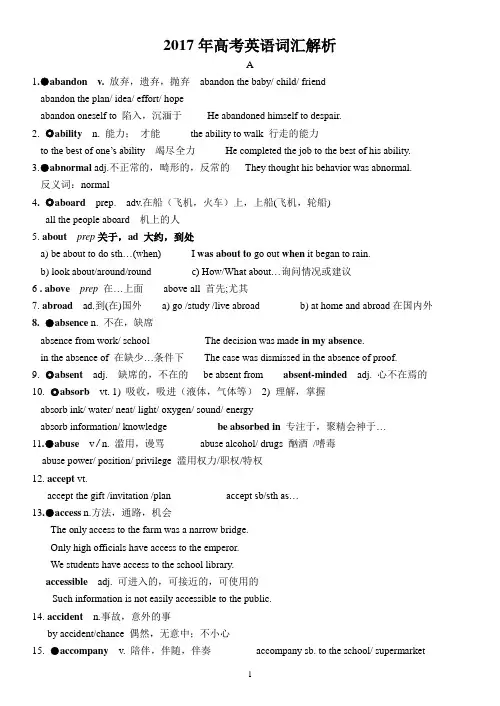
2017年高考英语词汇解析A1.●abandon v.放弃,遗弃,抛弃abandon the baby/ child/ friendabandon the plan/ idea/ effort/ hopeabandon oneself to 陷入,沉湎于He abandoned himself to despair.2.◎ability n. 能力;才能the ability to walk 行走的能力to the best of one’s abilit y 竭尽全力He completed the job to the best of his ability.3.●abnormal adj.不正常的,畸形的,反常的They thought his behavior was abnormal.反义词:normal4. ◎aboard prep. adv.在船(飞机,火车)上,上船(飞机,轮船)all the people aboard 机上的人5. about prep关于,ad 大约,到处a) be about to do sth…(when)I was about to go out when it began to rain.b) look about/around/round c) How/What about…询问情况或建议6 . above prep在…上面above all 首先;尤其7. abroad ad.到(在)国外a) go /study /live abroad b) at home and abroad在国内外8. ●absence n. 不在,缺席absence from work/ school The decision was made in my absence.in the absence of 在缺少…条件下The case was dismissed in the absence of proof.9. ◎absent adj. 缺席的,不在的be absent from absent-minded adj. 心不在焉的10. ◎absorb vt. 1) 吸收,吸进(液体,气体等)2) 理解,掌握absorb ink/ water/ neat/ light/ oxygen/ sound/ energyabsorb information/ knowledge be absorbed in专注于,聚精会神于…11.●abuse v / n. 滥用,谩骂abuse alcohol/ drugs 酗酒/嗜毒abuse power/ position/ privilege 滥用权力/职权/特权12. accept vt.accept the gift /invitation /plan accept sb/sth as…13.●access n.方法,通路,机会The only access to the farm was a narrow bridge.Only high officials have access to the emperor.We students have access to the school library.accessible adj. 可进入的,可接近的,可使用的Such information is not easily accessible to the public.14. accident n.事故,意外的事by accident/chance 偶然,无意中;不小心15.●accompany v. 陪伴,伴随,伴奏accompany sb. to the school/ supermarketaccompany the singer on / at the piano Lightening usually accompanies thunder.16. ●accomplish v. 完成,到达,实现accomplishment n. 成就,成绩accomplish the task/ purpose/ goal17. according to根据According to the law, he should be sentenced to death.18. ◎accuse vt. 指控,指责accuse sb of (doing ) sth 控告…19.●accustomed adj. 习惯的,适应的,惯常的be/ get/ become accustomed to doing He was soon accustomed to getting up early.20. ache vi./n headache / toothache My back aches so much.21. achieve vt 达到;取得achievement n 成就achieve success/victor y/one’s goal;22.◎achievement n. 成就,业绩;完成(任务等)make great achievements23.●acknowledge v. 承认,致谢It is generally acknowledged that global warming is caused by greenhouse gases.Yaoming is acknowledged as/ to be the best player in China.I acknowledged financial support from the local government.24. across prep cross v. I walked across the street.; cross a street; come/run across碰到25. act n.法令,条例vt.表演,扮演,行动,做事act as 充当;扮演act out 把…表演出来26. action n. 行动take action to do sth put sth into action 把…付诸实施27. active adj. 积极的;主动的take an active part in /be active in 积极参加28.◎activity n. 活动outdoor activities 户外运动29.actual a.实际的actually adv. in (actual) fact 实际上30●adapt vi. 适应,适合,改编vt. 使适应adapt to change /the city lifeadapt oneself to the new surroundings adapt the novel for a film adaptation n. 适应31. add vt 添加,增加,补充说(that)add(…)to 添加add up 把…加在一起add up to总计为; 总数为a) His illness added to our trouble. b) He added that he would come again.c) Please add these figures up. d) These numbers add up to 100.e) He added some salt to the water.32. address n.地址vt.写地址;向…讲话(尤指演讲)address the letter to sb. 给某人寄信The letter was wrongly addressed.The president addressed the public.33.●adjust vt. 调整,调节,适应adjust your speed /the volume/ the cameraadjust to the dark/ the single life adjust yourself to the student life adjustment n. 调整,调节34.admire v 钦佩.;羡慕admire sb for sth I admire John for his courage.35. admit vt(admi tt ed ,admi tt ed)1) 承认admit one’s mistakes; admit doing/having don eHe admitted having stolen the money.2) 准许(入场,入学,入会)admit sb to /into→sb be admitted toHe has been admitted to Beijing University.36.●adopt v. 收养,采用,采纳adopt a child the adopted son/ daughteradopt a new policy/ a suggestion/ a plan/ an attitude37. advance vi推进,促进;前进adj. advanced先进的/ 高级的in advance预先,事先an advanced worker38. advantage n. 优点,好处(可数名词) 反:disadvantagetake advantage of 利用have an advantage over 优于…to sb’s advantage 对(某人)有利39. ◎advertise vt. 为…做广告1)为…做广告advertise a product / things2)登广告征求/寻找… advertise for a new sales manager40. advice n/u. advise vt. 忠告,劝告,建议take/foll ow/ accept one’s advice 接受某人的建议ask sb for advice 向某人寻求建议 a piece of advice 一条建议give sb some advice on sthadvise sb (not) to do; advise doing; advise that …(should)+doOur teacher advised that we should study hard.41. ●affect vt. 影响, 深深打动,使悲伤等Smoking affects health. People were deeply affected by the death of Jin Zhengri.42. afford vt. 负担得起,抽得出(时间); 提供can/could/be able to afford sth/to do sth I can’t afford a book/to buy the book43. afraid a. 害怕的;担心be afraid to do 因为害怕不敢做…; be afraid of doing 害怕…She was afraid to go out alone at night. She was afraid of waking him up.44. against prep对着,反对, 靠着,迎着,衬着stand against the wall (靠墙站着) go against nature; be against sth 反对They are strongly against the plan. The pine tree were black against the morning sky.45. age n.年龄;时代vi. 变老for ages 多年; at an early age; at the age of … ;of the same age=of an age After his wife’s death he aged quickly.46. agree vi. 同意;应允1)agree with ①agree with sb / what you say/your opinion.②表示一致;― (食物、天气、工作等)对…适宜‖:The weather does not agree with me. 这种天气对我不适宜。
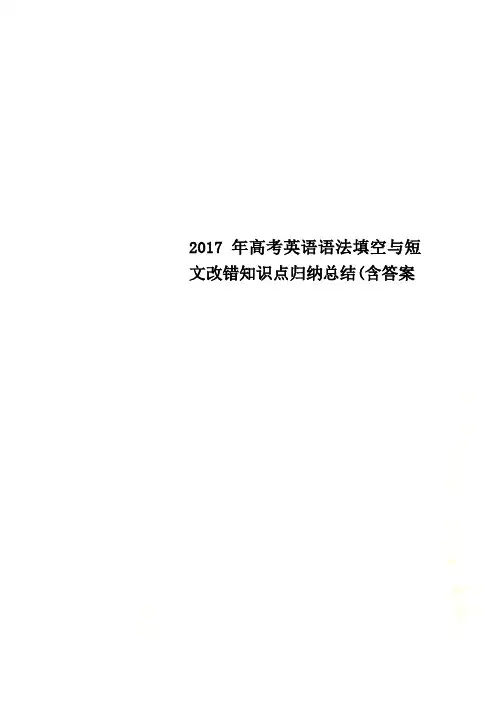
2017年高考英语语法填空与短文改错知识点归纳总结(含答案2017年高考英语语法填空与短文改错知识点归纳总结(含答案)一、名词的数语法填空1. (2017 全国 I 卷 62) This trend, ... , has had some unintended side62 (effect) such as overweight and heart disease—the very thing themedical community was trying to fight.解析:effects表示“一些意料外的副作用”,故用复数。
2. (2017 全国 II 卷 61) It ran for just under seven kilometers and allowedpeople to avoid terrible 61 (crowd) on the roads...解析:crowds避免拥挤的人群。
3. (2017 全国III卷 67) She has turned down several 67 (invitation)to star at shows in order to concentrate on her studies.解析:invitations由前面的several可知,要用复数形式。
短文改错1. (2017 全国 I 卷)The instructor kept repeating the word, “Speed up!” “Slow down!” “Turn left!”解析:word-*words后面有并列的三句话,故word用复数words。
2. (2017 全国 II 卷)Besides, they often get some useful informations from the Internet.解析:informations-information因information是不可数名词,没有复数形式。
高考/备考辅导2017年高考英语词汇辨析:benefit与benefit by/from的区别高考英语词汇辨析:benefit与benefit by/from的区别1. benefit by [from] 受益于。
如:The plants benefited from the rain. 植物得益于这场雨。
We benefit from daily exercises. 我们得益于每天做操。
We benefited greatly by this frank talk. 这次坦率的谈话使我们获益匪浅。
People who stole did not benefit from [by]•ill-gotten gains. 窃贼们并未从不义之财中得到好处。
Will the ADS patientsbenefit from [by] the new drug? 这种药对艾滋病人有效吗? We are sure to benefit from the new timetable. 我们肯定会得益于新的作息时间表。
He evidently benefited little from our advice. 很明显,他没有从我们的劝告中得到多少好处。
2. benefit sb (sth) 对某人或某物有益,使某人或某物受益。
如:The sea air will benefit you. 海边的空气对你有益。
The reign of a wise ruler benefits his country. 贤明统治者的统治有益于他的国家。
What he said benefited all the students. 他说的话使所有的学生受了益。
He has devoted his wholelife to benefiting mankind. 他把自己的一生献给造福人类。
His work didn’t benefit him; he got no money for it. 他的工作没使他受益,因为他分文未得。
2017高考英语易错词汇解析:引导结果状语从句such…that…和so…that…的用法区别such…that…与so…that…都可以用来引导结果状语从句,意为“如此……以致……”(1)such是形容词,它所修饰的名词可以是可数名词,也可以是不可数名词;名词前面可以带形容词,也可以不带。
如果其后是单数可数名词,前面需加不定冠词a或an.因此,such…that…的句型结构可分为以下三种:①such+a(n)(+adj.)+单数可数名词+that从句。
如:She is such a good teacher that all of us love and respect her.她是一位很好的老师,我们都敬爱她。
Table tennis is such an interesting game that people all over the world play it.乒乓球是一项很有趣的运动,以致全世界的人都参加这项运动。
②such(+adj.)+复数可数名词+that从句。
如:They are such interesting books that I want to read them once more.这些书非常有趣,我想再读一遍。
③such(adj.)+不可数名词+that从句。
如:It was such bad weather that I had to stay at home.天气太坏,以致我不得不呆在家里。
(2)so是副词,与形容词或副词连用,其结构是:so+adj.(adv.)+that从句。
如:He ran so fast that I couldn‘t catch up with him.他跑得那么快,我赶不上他。
I am so sleepy that I can hardly keep my eyes open.我太瞌睡了,眼睛几乎睁不开了。
注意:①当名词前面有many,much,few,little等表示数量多少的限定词时,应该用so,而不能用such.如:There were so many people in the street watching the fire that firefighters could not get close to the building.街上围观大火的人太多了,消防队员无法靠近大楼……②当单数名词前有形容词时,既可用so,也可用such,但不定冠词的位置却有所不同。
2017高考英语易错词汇解析:some times用法区别sometime,sometimes,some time,some times用法区别sometime(1)副词:某个时候。
可指过去或将来的某个时候。
如:① Would you come to the cinema with me, sometime? 赏脸找个时间和我看场电影吗?(将来)②We‘ll take our holiday sometime in August. 我们会在八月找个时间度假。
(将来)③ I bought this sometime last summer. 这是我在上个夏天买的。
(过去)④ This mansion was built sometime around 1980. 这栋大厦是1980年左右建的。
(过去)(2)形容词:前,过去的。
意思类似former.① This is our sometime general manager.这是我们的前任总经理。
② Our sometime classmate, Rose, is now a pop star. 我们以前的同学罗斯,现在是明星了。
sometimes 副词:有时候。
顺便提一下,at times也是“有时”的意思。
① Every man is a fool sometimes, and none at all times. 每个人有时都会犯傻,但没有谁会一直都傻。
② I sometimes have letters from him. 有时我会收到他的来信。
some time 某段时间。
常与for连用。
① We plan to stay in Hainan for some time. 我们打算在海南呆上一段时间。
② I will keep the computer for some time, so you can use it.这部电脑我会留着一段时间,你可以用。
2017年全国三卷重点词汇1.winery n.酒厂2.delicious adj.美味的,可口的3.pour v.倾倒4.transport v.& n.运送,运输5.period n.阶段,时期6.a free taste of ice cream免费品尝冰激凌7.depart v.离开8.duration n.持续时间9.authentic adj真正的.10.reservation n.预定,预约11.in preparation for为.....做好准备12.teary adj.泪眼婆娑的13.audience n.观众,听众14.appropriate adj.合适的,适当的15.be set in以......为背景16.warehouse n.仓库17.abandon v.遗弃,抛弃18.financial adj.金融的,财经的plex adj.复杂的20.miss v.想念,错过21.part with分开,分离22.be supportive of支持23.debate v.&n.辩论24.reintroduce v.重新介绍25.population n.人口26.continental adj.大陆的,大洲的27.gradually adv.逐渐的28.displace v.迫使某人离开家园29.disappearance n.消失30.consume v.消耗31.in the absence of在......缺席的情况下32.monitor v.监视,监管n.班长33.pack n.(狼)群v.把......装包34.a valuable experiment一次珍贵的实验35.bring about带来36.attitude n.态度37.doubtful adj.怀疑的38.disapproving adj.不支持的39.challenge v.&n.挑战40.well-being n.健康,安乐,康乐41.inactive adj.不积极的,不活跃的42.vision n.视野,视线43.preserve v.保存44.independence n.独立45.reaction n.反应,回应46.potentially adv.潜在的,可能的47.lose confidence in对......失去信心48.address n.地址v.解决(问题)49.at a constant speed50.solution n.解决办法51.blame n.&v.责备52.lie in在于53.reset v.重新设置54.reason n.原因55.now that既然56.timer n.计时器57.schedule v.计划n.时间表,日程表58.evaluate v.评价,评估59.keep track of追踪60.motivation n.动机61.in line排队62.round-the-world环球的63.discounted adj.打折的64.require v.要求65.go to good use派上用场66.absolute adj.绝对的,完全的67.in return座位回报68.scheduled adj.按计划的,计划好了的69.announce v.通知,宣布70.restriction n.限制71.origin n起源,源头72.relationship n.关系73.bargain v.讨价还价n.便宜货74.sacrifice v.牺牲75.experience v.体验,经历n.经历,经验76.interview v.&n.面试;采访77.honored adj.荣幸的78.intelligent adj.智能的;聪明的79.fresh-faced adj.新面孔的80.model v.给......做榜样;以......为模型n.模型;81.concentrate on集中注意力82.take a year off休假一年83.degree n.程度;学位84.architecture n.建筑85.take the offer接收帮助、邀请、资助...86.absorb v.吸引。
2017年全国二卷重点词汇1.architecture n.建筑2.occasion n.场合;时刻3.production n.生产4.translate v.翻译5.interpretation n.翻译,口译6.revolution n.革命7.eventually adv.最后8.director n.导演9.introduce v.介绍10.studio n.演播室,摄影棚11.stand up for sb.支持12.agent n.代理人13.respectful adj.尊敬的,表示敬意的14.virtue n.美德,德行15.typical adj.典型的16.aggressive adj.侵略的,有进取精神的17.underlying adj.潜在的,隐含的,根本的18.fortunate adj.幸运的19.institute n.机构20.financially adv.金融的,财经的21.unwilling adj.不愿意的sting adj.持久的plete v.完成adj.彻底的,完全的24.vehicle n.车25.fold up折叠26.deposit n.押金v.交...保证金27.go on sale 销售中28.cost v.花(…钱)n.花费29.permit v.允许n.许可证,通行证30.crash n.坠毁v.碰撞31.federal adj.联邦的32.requirement n.要求33.data n.数据34.attitude n.态度35.ambiguous adj.模棱两可的,含糊的】pound n.混合物37.apparently adv.明显的38.in effect实际上39.intentional adj.有意图的,故意的40.back and forth反复来回41.a whole lot许多42.interruption n.打断,打断43.disturb v.打扰44.boundary n.边界,分界线45.available adj.可获得的,可得到的46.elementary adj.基础的boratory n.实验室48.vote for为…投票49.average adj.平均的;普通的n.平均数50.dull adj.无聊的51.run into碰见,遇见52.workshop n.工作坊,研讨会,研习会53.envelop n.信封54.pass away逝世55.couldn’t help smiling情不自禁的笑了56.misfortune n.不幸57.disbelief n.不信,怀疑58.dishonesty n.不诚实59.update v.更新60.graduation n.毕业61.retirement n.退休62.separation n.分离63.resignation n.辞职64.caring adj.关心人的,体贴的65.conduct v.指挥;做…n.行为;举止;指引;管理66.passenger n.乘客67.carriage n.车厢68.tunnel n.隧道。
2017高考英语易错词汇解析:alive,living与live的区别alive,living与live的区别三者均可表示“活着的”,区别如下:1. alive 主要用作表语(有时可用作后置定语,但不用作前置定语),可用于人或动物。
如:He must be still alive. 他一定还活着。
He‘s the happiest man alive. 他世上最幸福的人。
注:若 alive 本身有修饰语,则也可用作前置定语。
如:He is a really alive student. 他的确是一个十分活跃的学生。
2. living 可用作表语或定语,可用于人或物。
如:Are your grandparents still living? 你的祖父母还健在吗?Both plants and animals are living things. 动物和植物都是生物。
alive 和 living 表示“活着的”,两者含义很接近,只要句法适合,有时可互换。
如:谁是当代最伟大的诗人?正:Who is the greatest living poet?正:Who is the greatest poet alive?若需严格区分,两者仍有差别:living 通常是客观描述某人“尚在人间”或“健在”,而 alive 则主要指生与死的“界限”。
如:He was still alive when I reached the hospital. 当我赶到医院时他还活着。
3. live 通常只用作定语(前置),可用于动物或植物,但一般不用于人。
如:He bought some live fish. 他买了几条活鱼。
Only a few live trees were left after the fire. 火灾之后只剩下几棵树还活着。
欢迎您的下载,资料仅供参考!。